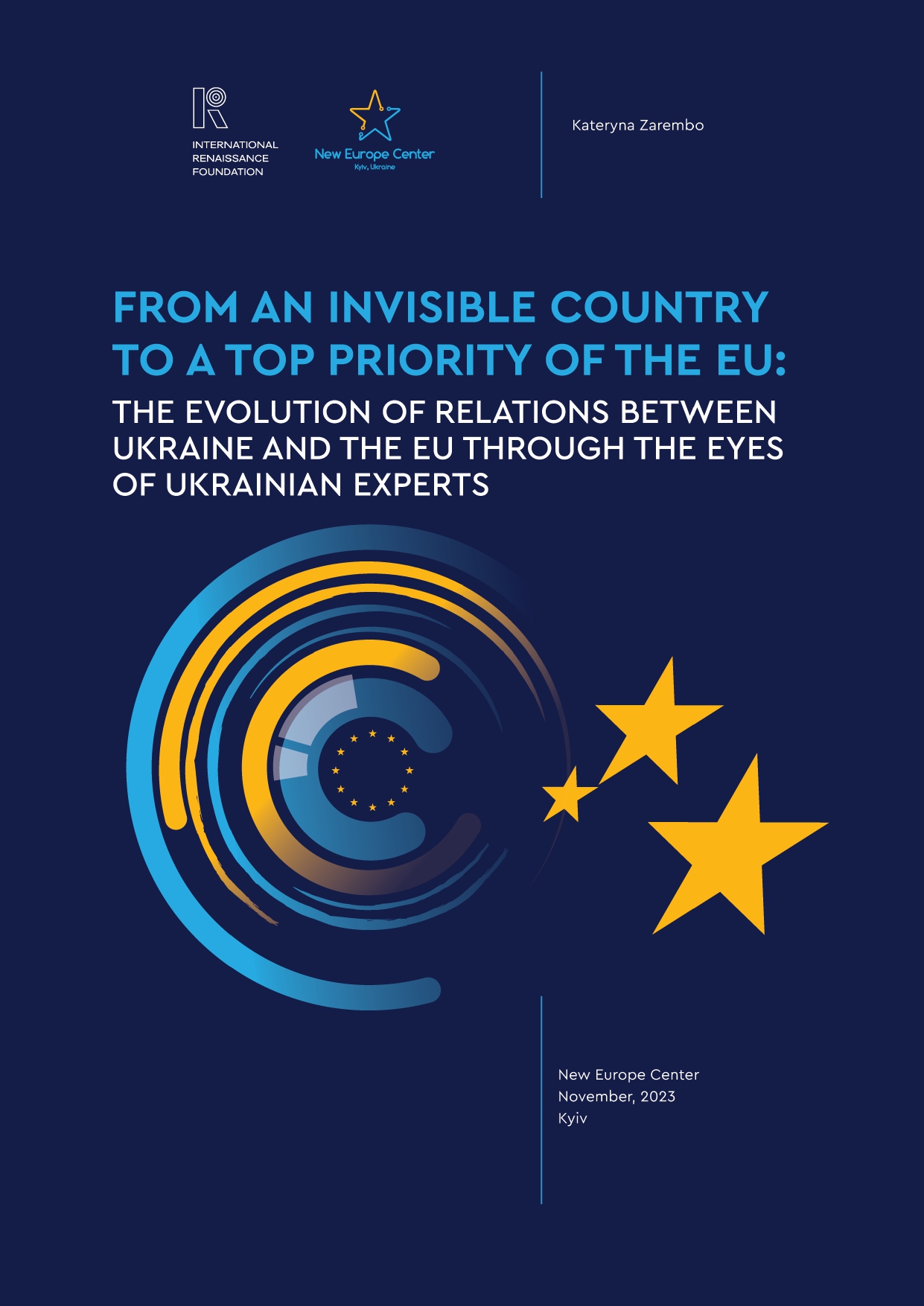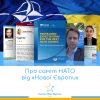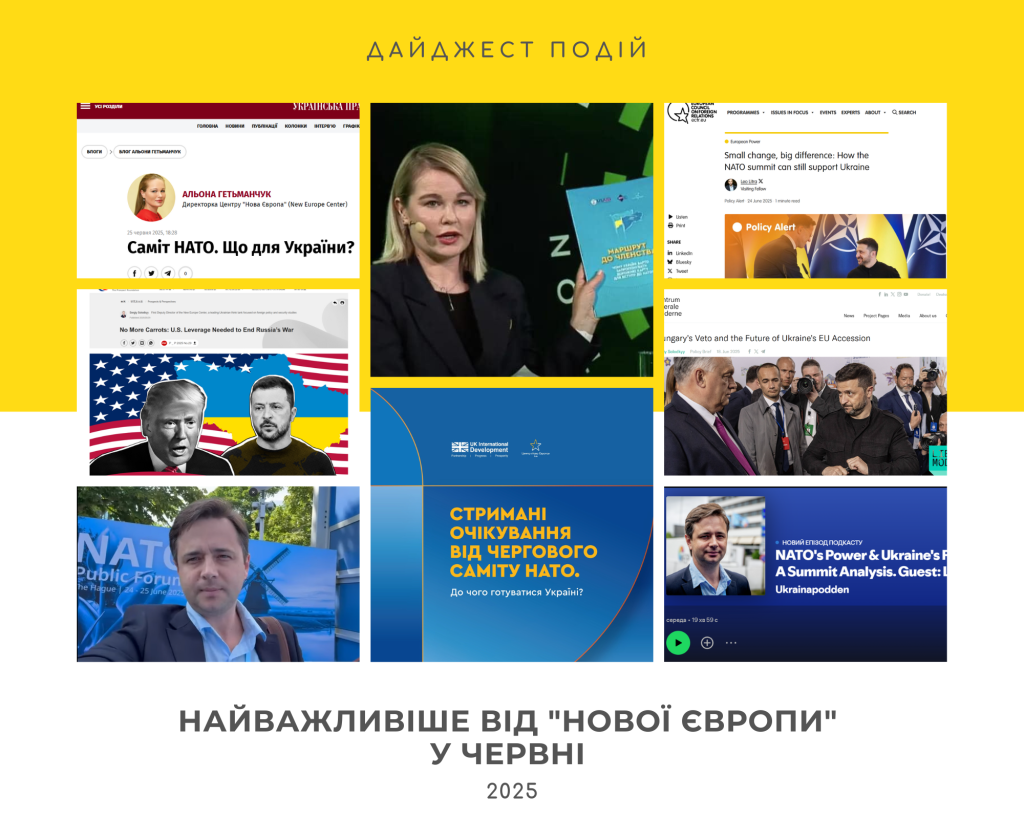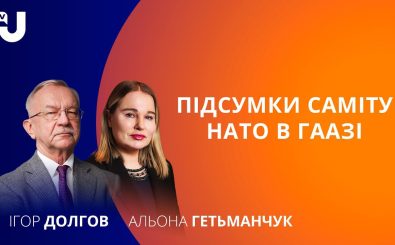
Exactly ten years ago, the Revolution of Dignity began, which cemented Ukraine’s European choice as irreversible. Later, the Russian war started – the occupation of Crimea and parts of the Donetsk and Luhansk oblasts, later – a full-scale invasion. Today, Ukraine is on the verge of opening membership negotiations with the European Union. What evolution took place during this time in the perception of the EU in Ukraine? Below we present a summary based on the results of twelve in-depth interviews with those representatives of Ukrainian civil society who have been professionally involved in various aspects of Ukraine’s European integration for a long time – at least ten, and at most 21 years: political dialogue, security, economy, human rights. They remember the various stages in the dialogue between Ukraine and the EU and possess a panoramic perspective and deep expertise to critically assess the current stage of relations between Ukraine and the European Union. Of course, the views presented are neither comprehensive nor exhaustive, but they allow to trace certain trends that can be extrapolated to a wider circle of Ukrainian civil society.
Those who have been following the relations between Ukraine and the EU for several decades note that during this time a grandiose evolution has taken place: from the time when Ukraine was being ignored, to Ukraine being a top priority for the EU. However, for this Ukraine has to go through extraordinary historical tests.
Finally “the family”?
Experts generally share the opinion that Ukraine has finally become “close” for the European Union, having overcome, according to one expert, the “psychological barrier” regarding Ukraine’s future membership in the EU:
“I once wrote that for me, the indicator that Ukraine has been accepted as “one of us” and they see the future in the EU will be when “Ukraine is Europe” will be heard not only from Kyiv, but also from the European capitals. And I remembered it during Zelenskyi’s visit to Berlin in May, when Olaf Scholz said in Ukrainian, “Ukraine is Europe.”
At the same time, some of the interviewees note that this tectonic shift took place quite recently, during the first months of the full scale invasion in 2022:
“The Revolution of Dignity did not lead to, for example, the formation of a more ambitious EU strategy towards Ukraine. I will remind you that both the Association Agreement and the Action Plan on visa liberalization were in place in Ukraine even before the Revolution of Dignity. This crossing of the barrier from the neighborhood – a third country, neighbor, partner – to a member of the family, it changed literally during the months of 2022. Of course, we can talk about the fact that it did not come out of nowhere, that it was years and decades in the making, but it happened right then, in this period between the end of February and June 2022.”
Several experts also suggested that among the decision-makers of the member states, and especially among the “Brussels Bubble”, there is now an understanding that Ukrainians are their future colleagues in the European Parliament, the European Commission, etc.
At the same time, according to the observations of experts, the European Union has become closer to Ukraine as well – not from the point of view of abstract geopolitical imagination, but on a practical level, at the level of intergovernmental cooperation: “Gradually, from a very amorphous concept, the European Union has broken down into individuals, politicians, programs”. At the level of civil servants, “[the EU] now stands for very specific people, very specific experts in the DG. You now understand how that thing, which is announced by the President of the European Commission, has been formed, and as a result, you know the person of the lower level who wrote all this. The European Union is a direct contact, you can invite a call, talk, discuss at your level.”
“For officials from the highest level to the lowest level, being included in some consultations with the European Commission is no longer a huge stress and a huge event, and it is already perceived as something that is a daily job.”
Several experts noted that the EU institutions in Brussels currently have the best understanding of Ukraine compared to many member states – so much so that in some capitals they even consider the European Commission to be biased in favor of Ukraine.
Non-linear hierarchy
Until a certain time, the metaphor of a student and a teacher was often used to describe relations between Ukraine and the EU, and EU colleagues could talk to their Ukrainian partners about the “homework” they had to do. Today, Ukrainian experts say that this metaphor has lost its power:
“The picture ceases to be so simple, linear, as it was 20 years ago, where there are teachers, where there are better students, where there are worse students and where there is a preparatory group. Ukraine was in the preparatory group. Teachers acted as bearers of a certain absolute truth. Now the picture is such that, in principle, even teachers are no longer bearers of absolute truth. It turned out that not all the best students were the best.”
According to one of the interviewees, “The European Union is a partner. “Partner” is not a friend, it is not an older brother, […] it is precisely partnership, it is a bilateral responsibility – both from our side and from the side of the EU.” While none of the experts denied the normative power that the EU has for Ukraine, many interviewees noted at the same time that the European Union itself sometimes does not have ready-made recipes, since not all member states have problems and/or institutions similar to Ukrainian:
“Well, for example, the reform of the Constitutional Court. Not all EU countries, especially those that give us recommendations, have a Constitutional Court. That is, they do not even understand how it should function in principle. Or anti-oligarchic reform. There are no oligarchs in EU countries. There is no such experience. But they gave us anti-oligarchic reform as one of the seven recommendations for candidate status. At first, it seemed to them that the law should solve all issues. Now it seems to them that the law will not solve it. They are looking for answers to these questions themselves.”
Accordingly, the experts noted that Ukraine is ready to negotiate with the EU on an equal footing, defending its interests and position. This can have both negative consequences, when the Ukrainian authorities may try to implement only facade reforms or sabotage EU requirements, and positive ones, when Ukrainian civil society proactively proposes and lobbies for an agenda in Ukraine-EU relations.
Perception of the EU policy regarding Ukraine: lessons learnt
Experts almost unanimously noted that the EU’s reaction to the full-scale invasion of Russia positively impressed them and increased the EU’s authority in their eyes. Quickly granting Ukraine the status of a candidate country, directing the European Peace Facility to the defense needs of Ukraine, adopting a number of sanctions packages against the Russian Federation, canceling trade restrictions, opening borders for Ukrainian refugees, giving up on Russian oil and gas – the interviewed experts recognized that they did not expect neither such speed, nor such flexibility, unanimity, or depth from the European Union.
The interviewed experts assumed that the EU took into account the lessons of 2014, when the reaction to the seizure of Crimea and parts of the Donetsk and Luhansk regions by the EU was slow, weak and fragmented, the first serious sanctions were introduced only after the downing of the Malaysian Boeing MH17, and Germany continued to build “Nord Stream-2”: “I had the impression that the EU was making up for what had not been done since 2014 at rapid pace.” The assessment of one of the interviewees was more critical: in their opinion, “the EU reacted to the full-scale invasion as it should have reacted to the Orange Revolution. The EU is two generations late,” and accelerated European integration became “a side effect of the war.” Some also pointed out that the sanctions against the EU are far from comprehensive, since trade with Russia continues: yes, in 2022, imports from Russia to Hungary, Austria and a number of other countries even increased (!)[1].
When asked if there were other cases when the EU’s actions did not meet their expectations, a number of experts recalled the delayed introduction of the visa-free regime with the EU at the time when Ukraine fulfilled all the requirements[2]. It is important, they emphasized, that progress in the European integration of Ukraine takes place on the basis of its achievements (merit-based), while delays on the part of the EU negatively affect trust in relations. At the same time, some of the interviewees noted that this principle should be applied in the opposite case as well. Some experts have expressed fears that the EU may avoid putting pressure on Ukraine to implement reforms during the war, and the European Commission, in their opinion, has in some cases assessed Ukrainian progress somewhat leniently. They emphasized that Ukraine should not receive “discounts” for the quality of implementation of the agreed reforms, “because everything that is not done properly now will play against the EU in the future.”
How Ukraine affects the EU
When asked about how Ukraine influences the EU, experts unanimously agreed that the European Union remains a source and authority for Ukraine in the matter of rule-making. At the same time, they identified a number of areas where Ukraine exerted or exerts an indirect but significant influence on the EU. It is primarily about the EU’s actions after a full-scale invasion, taking a step in the direction of further enlargement and showing flexibility and political courage, generally uncharacteristic of a structure based on procedures, bureaucracy and multi-voiced complex consensus. In other words, it can be assumed that thanks to Ukraine, the European Union has expanded its own imaginary “boundaries of the possible”. It is not only about decisions made immediately after a full-scale invasion, but about the interaction of two systems: the established EU bureaucracy and Ukrainian institutions, which are weaker than Ukrainian society, which quickly adapts and offers flexible solutions, which in turn are the basis of Ukrainian resilience – a phenomenon that is now actively studied in policy and academic circles.
On a more specific level, some experts note that Ukraine is already not a recipient, but a contributor of ideas and decisions regarding the future of the EU – for example, in matters of European defense union and strategic autonomy.
Recommendations:
Based on the results of interviews with experts, the following recommendations for the EU regarding further interaction with Ukraine and the region can be singled out.
- Do not repeat the mistakes of the previous stages of (non)enlargement .
Some of the interviewees had the impression that the EU now applies double standards to Ukraine, when Ukraine is judged by the behavior of other member states: “We are judged by the behavior of other member states. Not only by our background, the history of our reforms, but also by the behavior of other member states. Accordingly, they want to protect themselves as much as possible.” Presumably, it is about fears, in particular, about democratic rollback, following the example of Hungary. On the other hand, Ukrainian experts express concern that Ukraine can be negatively affected by both too fast (when Ukraine will not actually be ready for accession) and too slow progress – as in Turkey, when the high level of pro-European drive was reduced by decades of waiting. As mentioned above, Ukraine’s European integration progress should be based on the work done and have no unnecessary delays. It is important that the reform of the European Union should take place simultaneously with the Ukraine’s eurointegration advancement, and not precede it.
- Time to say goodbye to the Eastern Partnership.
While the Ukrainian expert environment has been critical of the Eastern Partnership policy since its inception – it united the countries whose goals were too different – today, according to some interviewees, it is time for the European Union to say that the Eastern Partnership has fulfilled its tasks.
[1]https://ecipe.org/blog/eu-russia-trade-since-the-war/
[2]At the end of 2015, the EU officially recognized Ukraine’s fulfillment of all conditions of visa liberalization, but the visa-free regime started only on June 11, 2017, after the creation and adoption by the EU of the visa-free suspension mechanism.
PDF-version is avialable here.
The material prepared with the support of the International Renaissance Foundation. The material reflects the position of the authors and does not necessarily coincide with the position of the International Renaissance Foundation.







